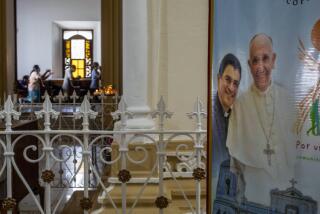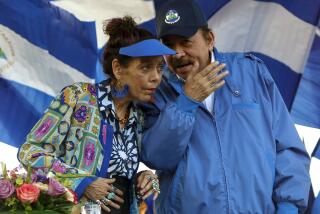Administration Trying to Increase Pressure on Vatican : Diplomacy: Officials are gathering new evidence in an attempt to persuade the Pope to turn Noriega over to the U.S.
- Share via
WASHINGTON — The Bush Administration is seeking to increase pressure on the Vatican to turn deposed Panamanian dictator Manuel A. Noriega over to the United States and plans to present new evidence of his alleged crimes to papal authorities in Rome, officials said Thursday.
U.S. Army officials are gathering documents and other evidence from the Panamanian general’s many homes in Panama, and Justice Department investigators are questioning a former Noriega aide in Miami, all with a view to “building a stronger case” that might persuade Pope John Paul II to expel the deposed dictator from the Vatican embassy, the officials said.
They said they also are exploring possible terms for a deal under which the Vatican could deliver Noriega formally into the hands of the new government of Panama and the Panamanian regime would immediately turn the general over to the United States.
Noriega spent his fifth day Thursday inside the Vatican’s embassy, where he took refuge from invading U.S. troops on Christmas Eve. The United States has asked the Vatican to turn him over for trial in the United States on drug-trafficking charges, but Wednesday the Pope’s official spokesman rejected the request.
“We think we have a strong case, and it may get stronger as time goes on,” a senior U.S. official involved with the case said. “A common criminal is not entitled to diplomatic sanctuary. If we get more evidence to present to the Vatican that he’s wanted for ordinary crimes--that this is not a political case--it will strengthen our position.”
Included in the evidence being prepared, he said, is testimony from Lt. Col. Luis del Cid, a former Noriega aide who surrendered to the U.S. Army after the invasion.
At the same time, officials said that the strain of playing host to Noriega may prompt the papal nuncio in Panama, Archbishop Jose Sebastian Laboa, to appeal to the pontiff for a resolution.
“He (Noriega) is a very unwelcome guest,” said one official. “Just look at the letter,” he added. The reference was to a letter Laboa wrote authorizing the U.S. Army to intervene if any Vatican embassy employees were taken hostage by Noriega or others who have taken refuge there.
As further evidence that the Vatican may be persuaded to change its mind, officials also noted that the Roman Catholic primate of Panama, Archbishop Marcos G. McGrath, has recommended that Noriega be turned over to the United States.
May Tire of Embassy
Besides, one official added, Noriega--known to be a bon vivant and raconteur--may tire of the church’s hospitality.
“Does he really want to be stuck in a monastery for two months?”
There is some hope, he said, for “an unexpected event”--like Noriega suddenly deciding either to give up or to attempt to escape on his own. One reason U.S. forces outside the nunciature in Panama have been playing rock music at high volume, he noted, is to increase Noriega’s discomfort.
The officials, who spoke on condition that they not be identified, emphasized that the Administration is sticking to its position of demanding Noriega’s release to U.S. authorities, and the issue may take weeks to resolve.
“We’re not near any quick breakthrough,” a senior official said. “. . . We’re nowhere near the end game.”
Indeed, White House press secretary Marlin Fitzwater appeared to harden the Administration’s position Thursday, saying that the United States could not accept a deal that would give Noriega refuge in another country because of the heavy price the United States has paid for his ouster.
Last spring, as U.S. officials despaired of deposing Noriega, the Panamanian leader was encouraged to voluntarily leave Panama for a third country, with the understanding that he would not be extradited to the United States.
Such an offer is no longer on the table, said Fitzwater, who is traveling with the vacationing President Bush in Texas.
Officials said they are confident that the Panamanian government would find a way to turn Noriega over to the United States if the Vatican decides to deliver the general to local authorities.
“Panama has been pretty flexible,” said one. “There are many ways of bringing this to a resolution. He can be turned over or surrendered or declared a detainee of U.S. forces. . . .”
Panama’s constitution prohibits the extradition of a Panamanian citizen to a foreign country. But officials said that the government there could hand Noriega over without formally invoking the extradition process, thus sidestepping the constitutional issue.
The Vatican’s diplomatic missions around the world, like other embassies, have long been sanctuaries for those fleeing political or religious persecution. Under accepted international law, foreign embassies cannot be entered by police or armed forces seeking to seize refugees.
The Times reported Thursday, however, that Laboa, the Vatican’s diplomatic representative in Panama City, had granted authority to the U.S. Army to take the necessary steps to free any Vatican embassy personnel taken hostage by Noriega or anyone else.
Asked whether the Administration sees a serious threat of hostage-taking, Fitzwater said: “We have no indication there is trouble within the nunciature. There are no hostages we are aware of.”
But, he said, he assumed that the letter granting the unusual authority to the Army had been written because “when you have people of the ilk of Mr. Noriega and his cronies, there certainly is reason to be concerned. If there is any danger there, we would be prepared to offer assistance.”
Fitzwater added that Bush had not spoken with the Pope about Noriega. “We think it’s appropriate that we not try to intervene in a way not appropriate to the decision-making process,” he said.
Times staff writer James Gerstenzang contributed to this report from Texas.
More to Read
Sign up for Essential California
The most important California stories and recommendations in your inbox every morning.
You may occasionally receive promotional content from the Los Angeles Times.














